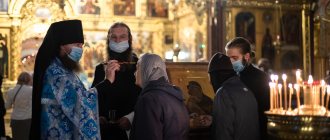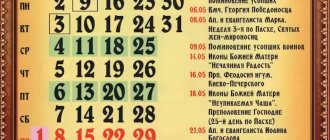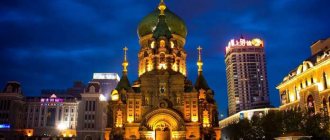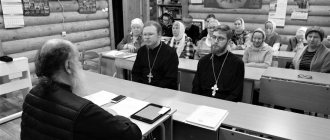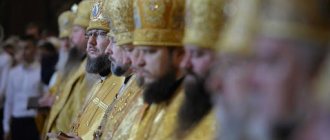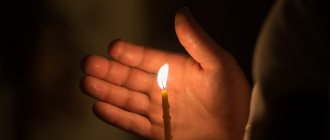What the Church Thinks About Online Dating
Official representatives of the Russian Orthodox Church, archpriests, and bishops do not prohibit parishioners from meeting each other on the Internet. If a young man or young Christian woman wants to meet with the goal of creating an Orthodox family, but there are no suitable people around, then you can search on the Internet. However, priests warn young people - they should not trust all resources; they should turn to Orthodox online communities. This also applies to mature people who are 35 years old, 40 or even 60. The audience on such services for believers numbers several tens of thousands of active users, including boys and girls, women and men of all ages who want to get married.
Church representatives remind that communication on the Internet will not replace live spiritual conversations. However, you should not rush to meet a new acquaintance; you should try to get to know the person in the light of the Gospel. Sometimes the feeling of loneliness is nothing more than a test of faith. It is necessary to take a closer look at how a believing user overcomes difficulties, avoids temptations, and strengthens his faith.
"Orthodox" Internet
Several years ago, the magazine already tried to give a brief overview of sites dedicated to religion, including, of course, Orthodox sites - see “WWW Review” in No. 5 for 2001 < /st.php?idar=324794
>
.
Even then, the compiler was struck by the elaboration of most of the sites set up on the Internet by the Orthodox Church, struck because the curses of some Orthodox publicists on the very phenomenon of the Internet were still fresh in his memory. That impression was confirmed - church leaders and simply religious people with a need to express their views were among the liveliest, most responsive and mobile on the Internet, even at the level of technical and design equipment of their sites. Our reviewer begins and ends the review with words about the vastness of the current Orthodox Internet. This is so, and here there are sectors where religious sites are presented as a socio-psychological phenomenon, there are sites that are a form of activity of the Russian Orthodox Church, and “ontological” sites, for those seeking deep thought, and not just the boiling of current ideological and social passions. Of course, each of these sectors (and many others) deserves a separate discussion, but for now the magazine decided to offer its readers reference material about, so to speak, the structure-forming resources of the continuous “Orthodox” Internet space.
Sergey Kostyrko.
It is not possible to give any complete overview of Orthodox sites or those identifying themselves as such on the current Internet - there are too many of them. Perhaps this was a feasible task five, well, four years ago. We do not set such a goal for ourselves: what is offered to our attention is not a guidebook, but just a dotted line on the map of the territory that in one way or another interests us in connection with this topic.
We will talk about the websites of the Russian Orthodox Church. They can be divided into four groups. The first group includes sites containing so-called official information about the Russian Orthodox Church, namely: documents, biographies of figures, reference data, resolutions, etc. That is, sites of departments, commissions and committees of the Russian Orthodox Church, diocesan sites. Websites of temples and monasteries. Here it would be appropriate to briefly talk about the websites of “core” educational institutions.
In the second group we would highlight sites conventionally called magazines. Online magazines include both electronic versions of publications published on paper, as well as independent network projects, and also, in a broader interpretation, the websites of some newspapers that identify themselves as Orthodox. The sites of this group were conceived and implemented as reading, implying analytical, artistic and journalistic, news, polemical, reference and other sections. In one form or another, such sites sometimes feature the “Questions to the Priest” section.
The third significant group of sites on Orthodox topics are reference sites. These include libraries, rubricators, classifiers, catalogs and specialized sites dedicated to, say, icon painting or church sewing. There are quite a few similar sites on the Internet, and they are no less, and sometimes even more interesting, than “socio-political” or “analytical”. Here, with a certain degree of conventionality, which any attempt at classification presupposes, some pages of numerous funds and centers appear.
The fourth group represents one of the most interesting sectors of the Network - the “living” Internet, constantly updated, fluid, “grassroots”, rapidly changing, “unprofessional”, which is rather unreflected traces of everyday human activity frozen in texts. This group includes projects of a practical nature - dating sites, specialized online stores and, of course, forums, Live Journals, personal pages.
Before starting the review, I will note two necessary, although seemingly self-evident, things.
The difficulty in representing the Orthodox Internet is the same as with the Orthodox non-Internet - it is heterogeneous. As well as his, the Orthodox Internet, audience, because a question of faith is always a question of self-identification, and even if a person does not know the elementary foundations of religious doctrine, no one has the right to deny him such self-determination.
And further. Many useful, informative sites, for obvious reasons, can be classified into two or even three groups proposed below. For example, an educational site can compile a library of the works of the holy fathers, and a news or analytical site can collect liturgical texts.
I. “Official” websites of the Russian Orthodox Church
The press service of the Moscow Patriarchate maintains the website “Patriarhia.ru Russian Orthodox Church”
— here is the Patriarch’s page and news related to the social activities of the head of the Church. Most of the site's sections are made in the format of a series of short messages. The site covers the activities of church publishing houses and the media, provides information about events related to the Old Believers and heterodoxy.
Official website of the Moscow Patriarchate < www.mospat.ru
> created under the Department for External Church Relations of the MP. The site contains documents - the charter of the Russian Orthodox Church, "Fundamentals of the Social Concept", interviews with hierarchs, the page of His Holiness the Patriarch and other materials.
The group of official websites of the Russian Orthodox Church can include the website of the Church Scientific
— it functions with the blessing of His Holiness the Patriarch, although it is not official in the exact sense of the word. The website contains materials from the TV show “Orthodox Encyclopedia”, which is broadcast on the TVC channel; scientific research, lectures, news, documents, library. There is a section “Patriarchal Ministry”.
It is not clear to the average reader which site is the “most official”; in a sense, the listed sites duplicate each other: each of them has its own correspondents who mainly monitor events occurring with the participation of the Patriarch.
There are websites of various committees of the Russian Orthodox Church: Synodal Commission
presented on
, The Educational Committee of the Holy Synod of the Russian Orthodox Church
publishes reports on its activities on
, The MP Department for interaction with the Armed Forces and law enforcement agencies
is located at
, Department of Religious Education and Catechesis - , Commission on Church Social Activities - , Department of Church Charity and Social ministry - , Youth Affairs Department -
and so on.
All of these sites vary in the level of information content; each covers a corresponding aspect of the activities of the Russian Orthodox Church. In addition, there are many diocesan websites, their profile can be social, historical, cultural, architectural, hagiographic and any other. Dioceses, in turn, have their own committees and departments that can maintain their own websites. Some of this subgroup, such as the website of the Missionary Department of the Ekaterinburg Diocese
or the website
of the Saratov diocese,
are updated regularly, engage in sect studies, reprint interesting materials appearing in other publications;
others are an electronic version of the diocesan newspaper, while others may not be updated at all. Separately, it is worth mentioning the “Diocese” portal,
whose tasks include strengthening the presence of Russian Orthodoxy on the Internet and “providing assistance to the diocesan departments of the Russian Orthodox Church in developing the Internet space and coordinating their activities within the framework of the project.”
Website of the Department for Religious Education and Catechesis of the Kazan Diocese “Church School”
presents various methodological developments, the most interesting subsection is “Serving the deaf and hard of hearing”,
“Dictionary of an Orthodox sign language interpreter”,
where, for example, you can see what “hell” or “akathist” depicted by hand looks like.
Representative websites of churches and monasteries in the proper sense of the word (not analytical, not cultural portals) are, so to speak, business cards with schedules of services, such as, for example, the website of the Trinity-Sergius Lavra
or
the Cathedral of Christ the Savior
(however, press conferences and other events are held in some halls of the Temple complex of buildings; information about them can also be found on the website). In other cases, projects deserve a separate discussion.
Educational establishments. Moscow Theological Academy
— presented on
https://www.mpda.ru/,
the site contains sections “School”, “Spiritual Life”, “Museum”, “Library”.
Orthodox St. Tikhon's University for the Humanities
, among other things, provides for the possibility of distance learning, so to speak, without leaving the Internet.
St. Petersburg Orthodox Theological Academy.
Educational sites are also organized differently, for example, the site of the Stavropol Theological Seminary is called
“Orthodoxy in the North Caucasus”
and contains, albeit in its infancy, a section “About Islam.”
The audience of sites included in the official group is, naturally, mainly churchgoers. This is related to the peculiarities of the presentation of material and the selection of topics and plots.
2. "Magazines"
The undisputed leader of this group and generally the recognized leader in the religious and religious studies, not only the Orthodox part of the Internet is a project operating with the blessing of the Patriarch, but not an official website of the Russian Orthodox Church, which began as the Internet page of the Sretensky Stavropegic Monastery and quite quickly became one of the most visited resources section “Religions” of any search engine - “Orthodoxy.Ru”
<
www.pravoslavie.ru
>
.
Here, over more than five years of operation of the site, materials of a wide variety of nature have been collected, from polemical to reference, and there is a regular news feed.
“Local Churches” deserves special attention
essentially a separate encyclopedic project containing cataloged information on sixteen Churches, including such distant ones as the Japanese and Chinese.
In January 2006, the two largest resources in the “Religions” section of the Russian Internet merged - the sites “Pravoslavie.Ru” and “Orthodox Calendar”.
“Calendar” is one of the most informative projects to date - it contains information about 7,500 saints: lives, icons, troparia, lists of churches throughout Russia where these saints have thrones or their relics are kept.
There is information of a liturgical nature - a complete list of saints for every day, liturgical instructions, gospel readings for every day. “Thoughts for every day” by St. Theophan the Recluse and John Chrysostom are arranged by day. Information is given about the meal: fast or fast day, and if fast, then what is the degree of severity of fasting according to the monastic charter. On the website you can, for example, see a list of saints and icons for a specific day, a list of Moscow churches compiled by deanery or by proximity to metro stations. A special module works: by entering his date of birth and name in Holy Baptism, the visitor can find out about his heavenly patron. In addition, the entire corpus of Bible texts in the Synodal translation is presented here. The “Orthodox Calendar” can be downloaded in electronic form, and in the near future it is planned to open a special version for mobile phones. The updated version of the calendar is located at https://days.pravoslavie.ru/
Many magazines are trying to be represented both on the Internet and on paper. The brightest illustrated magazine is “Foma”,
it is published on paper, but is also available on the Web:
https://www.fomacenter.ru/,
intended “for believers and non-believers,” but self-identifies as an “Orthodox magazine.”
Interviews, reports, essays, discussions. The materials are written in human terms. The same color - “The Neskuchny Garden”.
These are magazines whose materials are not intended for wide public discussion - rather for concentrated home reading. The phenomenon itself is curious: a glossy Orthodox magazine. The number of such journals, one might think, will grow.
Magazine "Holy Fire"
posted on the Internet on the already mentioned “Pravoslaviya.Ru”, but it is published as a supplement to the thick literary magazine “Moscow”, it is also on the “Moscow” website in an extremely simple design. This is a polemical, journalistic “serious” magazine. It has a mysterious frequency: 13 issues since 1998. The editors have tough, irreconcilable positions on many controversial issues.
“Alpha and Omega” is a magazine devoted mainly to theological problems, its declared goal is to acquaint the reader “with the real state of affairs in the area that illuminates the relationship between Scripture and Tradition within Orthodoxy.”
Journal " Orthodox Conversation"
contains “Conversations on Orthodoxy”, “Parents’ Forum”, “Orthodox Review”, etc.
Perhaps the student magazine of the Moscow Theological Academy “Meeting” will seem interesting.
One of the most visited resources is the website of the Orthodox News Agency Russian Line
»
- with some degree of approximateness, we will classify it as a group of “magazines”. Although the emphasis is primarily on the news feed, what is interesting, in our opinion, is the section “Library of Periodicals,”
placed on the front page as a “Recommended Reading” section.
You cannot ignore the website of the “Orthodox society (brotherhood)” “Radonezh”.
Here, in addition to audio recordings of Radonezh radio broadcasts, an “Orthodox television and radio fund” has been collected, the Club of Orthodox Journalists is stationed, and a pilgrimage service operates.
“A Look and Something” is widely represented by the project “Pravaya.ru”
- here you have “The Essence of the “Liberal Project” in Russia” and “The Problem of Modern Orthodox Preaching”, from every pine forest. Sometimes very fresh, sometimes perky obscurantism.
Magazine "Russian House"
used to be something of a supplement to the TV show of the same name, after the TV show closed, it came out on its own for some time. Recently “Russia House” resumed broadcasting.
The “Orthodox general education portal Slovo” may be interesting.
— the range of topics is very wide: from controversial punctuation issues of the modern Russian language to the history of ancient Platonism. There is a large section “Preschool Education”, containing teaching methods, lesson notes on the Law of God, scripts for matinees and holidays, etc.
“Orthodoxy and Peace” - “for those who are looking for the way to the temple”: collections of materials published on other sites, collected to resolve questions like: “I personally know many people who are confused by cell phones in monasteries, foreign cars of priests, golden domes against the backdrop of general poverty. For them, this question is an obstacle on the path to God.” Interpretations of the Holy Scriptures, spiritual literature, Lenten cuisine.
“Russian Sunday” is published under the motto “Orthodoxy, autocracy, nationality.” Separate pages - “Russian Statehood”
, “Songs of the Russian Resurrection”, “Union of Writers of Russia”, “Russian Conversation.
Orthodox Forum" and others.
For beginners - "Zavet.ru",
"information and educational project." A special section is “Little Things”: “We present small works of fiction and life stories written by both professional and amateur authors.” Section “Moms and Dads”, a small thematic library.
A collection of works by contemporary authors for the Orthodox reader is presented in Filgrad,
author's project by Philip Filippov.
A separate subgroup is the websites of Orthodox public figures. It is not possible or necessary to list at least some, even the most significant, part of them; for example, there is only one link - the project of Natalia Narochnitskaya “Narochnitskaya.ru”,
the site is “for those who live in Russia,” as the banner says.
Orthodox newspaper - "Church Bulletin"
Opposes
"Russian Messenger";
The specialized
“Sunday School”,
the student newspaper
“Tatiana’s Day”, “Siberian Orthodox Newspaper”
and others are also represented. I would like to say something special about the “Siberian Orthodox Newspaper”: it houses the “Encyclopedia of the Orthodox Christian,” a beautifully designed, although slightly dry page of the regional movement “Young Orthodox Siberia.” Here, in the section “The Basics of Orthodoxy,” it is told, for example, how to be baptized correctly, what proper behavior should be in church, how and why candles are lit, and how to correctly compose memorial notes. It is these questions that become stumbling blocks for people just entering the temple. The following explanations are not at all superfluous: “There is no need to listen to talk about how a candle should only be lit with the right hand; that if it goes out, it means there will be misfortunes; that melting the lower end of a candle for stability in the hole is a mortal sin, etc. There are many superstitions around the Church, and they are all meaningless” - or: “For the repose of those whom the Church has glorified as saints (for example, Blessed Ksenia), pray already no need".
3. "Libraries"
One of the most complete systematizers of Orthodox resources on the Internet is the large catalog “Orthodox Christianity: catalogue, rating, search”.
In total, there are 13,500 sites listed here, they are systematized according to several criteria: by administrative, geographical, thematic, by the method of presenting material (news sites, analytical, artistic), by languages (literature is presented in sixteen languages). There is an alphabetical index. New sites are registered at a rate of tens per week. There is a traffic rating here, the degree of accessibility of links is monitored.
Another simple rubricator that is easy to use is the author’s project “Pagez.ru”,
it was created by Andrey Lebedev. The site is quite academic: there is a library of patristic heritage, including thematic dictionaries - a dictionary of Orthodox terms, a short dictionary of the Church Slavonic language, “Capital - lowercase”. Here you can find a synopsis of the Gospel, the Philokalia for the laity in excerpts, and even selected articles from the Brockhaus and Efron encyclopedia. In addition, there is a catalog of links to Orthodox literature on the RuNet and a section “Orthodox Internet”: a catalog of links to pages and sites. Latest arrivals and offshoots reported, detailed search.
By the way, it should be noted that there are several specialized search engines, such as “Iskomoye”
or
"Nika".
You can search the Orthodox Internet on the site
"Collection.ru",
which contains a collection of Orthodox sites.
One of the most complete Orthodox electronic libraries is called “Annunciation”,
it was created at the Moscow Church of the Annunciation of the Blessed Virgin Mary in Petrovsky Park.
The library is thematic, including modern publications; in our opinion, the section “Modern Temptations” is of particular interest. Modern culture: Satanism or God-seeking?
The “Virtual Catalog of Icons”
is located at https://www.wco.ru/icons/ The “Library of Patristic Literature” is worthy of attention.
at the Orthodox gymnasium in the name of St. Sergius of Radonezh, Novosibirsk, Akademgorodok. Here are the Bible and patristic works in Church Slavonic, a large set of liturgical books - Lenten and Colored Triodion, Octoechos, Menaion, Book of Hours, Followed Psalter, Canon, Typikon, Breviary, Akathists, prayers, Service Book; the archive of the "Journal of the Moscow Patriarchate", although incomplete. Here is a short but very informative page of links, focused on the selection of sites containing documentation, manuals, and programs for working with texts in Church Slavonic.
Library entitled “Unknown Pages of Russian History”
presented on the Russian Sky website, the server itself falls into the second group - “magazines” - in our classification. The library contains both a guide to the study of the Holy Scriptures of the New Testament by Archbishop Averky, and a varied collection of books: “Masons and Decembrists”, “The Great Chessboard” by Brzezinski, even the “Lenin Dossier without Retouching” was included. The principles of selection for this thematic library are not always clear, but the emerging intellectual portrait of one of the collective types of our contemporaries is all the more interesting.
“Evensong” is dedicated to “ancient Russian singing, worship and bookishness”
with several subprojects posted here.
Here you can find sheet music, sound recordings, a thematic reference book, etc. Similar information is available in the “Znamenny Chants Foundation”,
and there are also links to other projects of this kind.
Project “Orthodox Russia”
hosts Orthodox pages.
The full list of sites presented on this resource is vast; moreover, they are arranged according to the time they were added, and there is no way to view them alphabetically. But here is one, for example, “Orthodox Medical Server” -
presents a review of the press, a list of hospital churches in Moscow, the lives of holy doctors and patrons of medicine, a library where you can find “Advice for a sick person in a modern hospital”, articles on current topics, for example “Lent from the point of view of an allergist,” or benefits to help parents of sick children.
“Christianity in Art: Icons, Frescoes, Mosaics”, there is also the text of the Bible based on books, but the main thing is a large gallery of icons, frescoes and other images, including traces of icons, book miniatures, sewing; the gallery is organized by topic, by school, by author, by current location, etc. A small library containing mainly works on iconography. The “Links” section presents more than ten other sites dedicated to Russian icons, as well as links to sites of museums, churches and monasteries, and others. Links to the author's iconographic workshops.
"Bells" - bell casting, ringing, famous bell ringers and even a training program.
About one and a half thousand temples and monuments are described by the project “People's Catalog of Orthodox Architecture”,
The goal of this author’s project is truly global: “to collect, as far as possible, the most complete description and modern photographs of all Orthodox churches, monasteries, temples, cathedrals, chapels and other Orthodox buildings in Russia.” Architectural structures are classified according to geographical and diocesan principles. 73 active co-authors take part in compiling the catalogue.
The “Photo Guide-Russian Churches” contains stories and images, including those of churches and monasteries that we have already lost.
“Foundation of the Holy All-Worth Apostle Andrew the First-Called” is a website of an Orthodox public organization engaged in missionary activities. "Information and Consultation Center of Irenaeus of Lionsky"
- sect studies.
4. “Live” Internet
Stores: “Christian online store” at the Church of the Annunciation of the Blessed Virgin Mary, called “Omega”,
offers books, icons, disks, cassettes.
Even stickers and games. There is a specialized Orthodox section in the Bolero
with a detailed thematic catalog of products.
Until recently, the electronic store of Orthodox literature “Sretenie” also operated,
but “for technical reasons” its work was suspended, however, in order to avoid misunderstandings, it is worth mentioning that the offline store of the same name is open.
A separate issue is “Orthodox dating” sites. At first glance it seems strange, but this is not the know-how of the “Orthodox” Internet - similar pages operate on the “Islamic” Internet, etc. Here you go - “Love”.
“An Orthodox girl, 27 years old, is waiting for a letter from the man who will become her husband. I wish everyone good and peace!”
"Dating club for Orthodox Christians Svetelka
": "Moskvich. I am looking for a friend with whom I can create a strong family based on love. We will have the most Orthodox family in the world!”
LiveJournal is great for communication.
or any of its variants, for example, a domestic version of a service for maintaining an online diary.
This service, which allows you to make daily entries in any form and comment on the entries of other authors, is used not only by the laity, but also by priests and monastics. At least two “alternative” lists of clergy, monks and nuns leading LiveJournal are known: and .
(Of course, not all of them belong to the Russian Orthodox Church).
In LJ you can search by interest, and about one hundred communities and almost five hundred users are interested in the topic “Orthodoxy”. “Network Navigator” project was undertaken on the website “Credo.ru”
where, among other things, “Orthodox LiveJournal communities” and “New trends in the Orthodox sector of LiveJournal” were considered. Many “Orthodox publicists” lead LJ, where would we go without this?
The most visited of the forums is “Man and His Faith”
on the website of a modern public church figure, deacon Andrei Kuraev
.
The subtitle of the forum is “missionary.”
Personal pages with artless simplicity testify to faith. Author's project “The Parish of the Church of the Ascension of the Lord over the tomb of St. Blessed Isidore the Wonderworker”; "Ringer's Home Page" by Evgeniy Volkov; “Apology for Orthodoxy” by Roman Beregovoy
(sect studies and cute home photos);
altar server Mikhail Sychev's page;
website of the “servant of God Elena” “Orthodox craftswoman” (album for cross stitch. Schemes of drawings for bags for prosphora, valances for shelves with icons, napkins for Easter cakes, cards for Easter and Christmas, bookmarks for books), page
“Orthodox believer from Japan Kirill”,
everything is in Japanese, nothing is clear, but it’s great to unexpectedly see the icon of the Mother of God in such a context.
Truly, Orthodox people do not sit in the information underground. In just five years, almost since the first “profile” projects on the Internet, when it was seriously discussed whether the electronic network was catching veliar,
sites that are distinguished by emotional calm and depth, good presentation of large volumes of information, and simply beautiful, elegant design - many such sites on Orthodox topics have appeared. Naturally, they are heterogeneous. Calm restraint, encyclopedicism and a general focus on serious ontological issues emanate in the virtual halls of libraries, and the saddest smell of ignorance is in discussions of many acute, painful, burning topics on forums of various kinds. This is not a feature of the Orthodox Internet - it is a feature of the Internet in general, as perhaps the most impartial - and therefore ruthless - mirror of society. In matters of religion, our society is still, in spite of everything, pristinely innocent, if not monstrously ignorant.
...In conclusion, I will repeat the idea of the inevitable conventionality and fragmentation of such reviews: there will be more and more sites worthy of attention, and some of the previous projects may have exhausted themselves. There is no doubt that a review of the Orthodox Internet, no matter how detailed it may be, will become outdated in the very near future.
https://magazines.russ.ru/novyi_mi/2006/5/orl18-pr.html
How to Find a Reliable Christian Dating Site
Have you decided to meet a Christian or Orthodox woman, but don’t know where and how to do it? On the Internet you can find hundreds of resources that promise Christian dating without standard registration, private advertisements with user phone numbers. You need to be wary of such offers - among the users there may be unscrupulous people who can lure money out of you, taking advantage of the purity of your thoughts.
Trust our ranking of dating sites for believers. We have selected the best free services where you will find like-minded people in Moscow and other cities of Russia. Many of the resources presented in the ranking resemble a social network for Christians. Here you can communicate for free with loved ones and meet new friends, create photo albums, congratulate them on name days, use the chat for correspondence, and keep track of church holidays in a special calendar. Confessional dating services for Orthodox Christians allow you to meet people around the world who profess Orthodox Christianity.
Orthodox Internet portals in Russia
In this article I want to introduce you to the most interesting and popular Orthodox portals ru. Despite the fact that there are an innumerable number of sites dedicated to the Orthodox faith in Russia, only a few of them are distinguished by their meaningfulness and richness of content, as well as by their interesting presentation of material. So, in my opinion, among the Orthodox sites of Ru, the following especially stand out in a good sense: Orthodoxy and Peace (www.pravmir.ru), ABC of Faith (www.azbyka.ru) and Orthodoxy. ru (www.pravoslavie.ru). The site of the Orthodox magazine Thomas deserves special mention, which in terms of interestingness and relevance of the content, as well as traffic, is in no way inferior, and in some places even surpasses other leading Orthodox sites ru. Let's start with it. As befits a good Orthodox portal, the Thomas website has very convenient navigation, thanks to which you can find articles both by topic and by author. From them you will learn a lot of new things: how to prepare a child for the first confession, how to determine the boundaries of what is permitted for children, how to distinguish true love from attraction, etc. The topics of the articles are selected in such a way that they are useful mainly for the laity, and this, it seems to me, is the main advantage of the Thomas site.
The most popular Orthodox sites
Let's move on to the next popular Orthodox portal: Azbuka.ru. The name of the site speaks for itself: its main focus is educational. This site does not need advertising: due to the fact that it contains a lot of interesting information regarding the fundamentals of the Orthodox faith, Christian dogmas, church holidays, Holy Scripture and much more, it has become one of the most popular Orthodox sites. The Christian website has a detailed church calendar, from which you can find out what Orthodox holiday is today, keep abreast of fasting and fasting days, and also track other important events of the liturgical circle. Of course, the popularity of the portal is also increased by the Orthodox dating section - a bold and good undertaking, from my point of view, which, judging by the many positive reviews, has helped many single people start a family. Another Orthodox portal ru - Pravoslavie.ru - has a Christian-social orientation: the topics of its articles are clearly problematic, describe the problems existing in Russian society and propose various ways to solve them. On this site you will also find questions regarding interfaith relations. The highlight of this Orthodox site ru are Orthodox educational lectures.
Missionary and social activities of the Orthodox website
It is impossible not to note the fact that most popular Orthodox portals carry an educational mission not only for beginning Christians, but also for people who are still far from the church: competently and interestingly presented articles on them contribute to the manifestation of interest in the Christian faith, to the understanding that Orthodoxy is not an archaism at all, but the most living and actively developing religion in which people of completely different ages, make-up and temperament can find a place for themselves.
For example, the Orthodox website Pravoslavie.ru and the world is very involved in charity work - thanks to its employees, those who want to help those in need and do not know how best to do this can actively participate in the public life of the Orthodox Church. The “Science” section is also very interesting, allowing you to look at the structure of the Universe from a new angle through the eyes of a believer. So, as we see, thanks to the diverse focus of Orthodox portals ru, a variety of people will find something interesting and educational for themselves on them.
Tagged with: prayer training religion Christianity
Previous
Next
THIS IS A MUST READ
THIS IS A MUST READ
Daily lunar calendar for visiting the dentist for February 2022
20:12
Detailed lunar calendar for winning for February 2022
14:04
Exact lunar calendar of image changes for February 2022
22:33
Accurate lunar health calendar for February 2022
20:59
Accurate lunar dating calendar for February 2022
17:34
Daily lunar calendar of beauty and attractiveness for February 2022
17:04
Leave a comment Cancel writing
How to take the first step
Using Christian dating sites is easy and fun. To do this, you need to register and fill out a form. Choose several services from the top 5 of our rating and register for them. Many Orthodox websites offer to take a test that will help identify your basic character traits, the depth of your faith, and find out your preferences and unacceptable things in a relationship.
After registration, you need to upload your best photo and fill out your profile. A detailed questionnaire containing basic information about you will simplify the choice of a person living a spiritual life. Indicate the purpose of your presence on the site - for example, I’m meeting an Orthodox man or looking for a Christian woman. View other users' profiles, show generosity and sympathy, and chat. Activity on the site is your key to successful dating.
